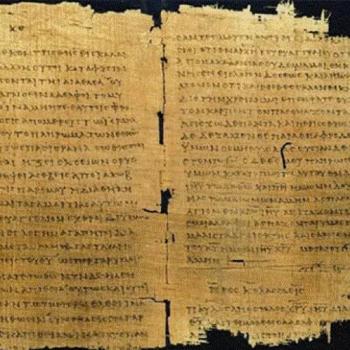Biblical Reliability Revisited
If you were to read a biography of George Washington, what would you expect to find? Maybe you would expect to find information about his family. You may see information about his education and his upbringing. As you read, you would end up seeing his achievements and landmark accomplishments. You would expect to read about his presidency, crossing the river at Trenton, and would see his vision that led to the capture of Cornwallis at York. Perhaps you would also see the embarrassing details of his life as well. You would see his failure during the French and Indian War at Fort Necessity. This is where he led a force of 350 troops into a failed siege defense. His slaveholding and his inability to keep the loyalty of a star general, Benedict Arnold would raise eyebrows. The embarrassing details would add credibility to the big triumphs as they appear side-by-side.
In this biography, you will also find names of people from the time, place, and location where the events surrounding George Washington occurred. You wouldn’t expect to find names from Egypt in the 1800s to appear in a biography of one of the United States most cherished Founding Fathers. For more George Washington Content, check out THIS encyclopedia.
The Historicity of a Biography of George Washington is Similar to a Biography of Jesus
The same way you would look for those sorts of details in a biography of George Washington is the same way you would look for this information in a biography of Jesus of Nazareth. Imagine you are reading a biography of someone from the 1st century in Palestine. You would look for the names of officials, both national and local. And you would look for names of people who (even if obscure) would prove to be local. Even more so, you would look for names that were localized to the very cities in which they were the most popular. You wouldn’t expect incredibly popular names in the city of Rome (outside of national officials) to appear too often in a biography of a person centered around Jerusalem.
When one looks at the Gospels, this is precisely what we find. Names of people from Capernaum fit the mold. The names of the apostles fit the names that we would expect if they lived in and around Judea.
Names Help Us
When you see names in a biography, if you’re like me, you may immediately look them up. The names that we see add to the depth and reliability of the events being told. Given that the Gospels were written within the timeframe of the lives of eyewitnesses (a topic that we will cover in this series) it’s as if the writers are saying: “If you don’t believe us, then ask them.”
At the same time, the names of important officials help us pinpoint the time frame of an event. If a writer talks about the reign of a king or a queen, then the timeframe of the event is easier to pinpoint. With this, I want to provide you with a list of names that occur in each of the Gospels. I hope that it is helpful for you as conduct your research on these names and titles.
You’ll also notice that Luke has many more Government Officials in his Gospel. Being that it appears that he was commissioned by a man named Theophilus to conduct the writing of history and claims to have used other eyewitness accounts, one may assume that the wealth of resources at his disposal only bolsters his credibility as a historian. We’ll revisit this once we talk about the book of Acts.
THE LIST OF NAMES THAT APPEAR IN THE NEW Gospels
For our brief study, I have read through the Gospel accounts and took note of the names and titles in the Gospels. I did not count how many times they appeared as it is irrelevant to us.
I also didn’t take note of names that are references for past events. If Moses and Abraham are referenced in dialogue, for instance, I did not add them in.
I also took note of Groups such as Jews, Greeks, Pharisees, Sanhedrin, and others. Distinctions of who was Jewish and who wasn’t as well as the different religious parties of the time should be expected if we are reading a 1st-century biography of Palestine.
If there are any that I missed, feel free to comment below! I would love to update the list!
Names and Titles in the Gospel of Matthew
| Mary | Judas Iscariot | Philip |
Simon of Cyrene
|
| Joseph | Gentiles | John (Brother of James) |
Mary Magdelene
|
| Jesus | Samaritans | The Herodians |
Mary (Mother of James and Joseph
|
| King Herod | Judas (Brother of Jesus) | Caesar |
James son of Zebedee
|
| Magi | James (Brother of Jesus) | Caiaphas |
Peter’s Mother-in-Law
|
| Archelaus | Simon (Brother of Jesus) | Simon the Leper | Matthew |
| John the Baptist | Joseph (Brother of Jesus) | Rabbi | Andrew |
| The Pharisees | Herodias | The Sanhedrin |
John Son of Zebedee
|
| The Sadducees | Disciples | Pilate the Governor |
James Son of Alphaeus
|
| Simon (Peter) | The Messiah | Barabbas | Thaddaeus |
| Joseph of Arimathea | Apostles | Simon the Zealot |
The Mother of Zebedee’s Sons
|
Names and Titles in the Gospel of Mark
| Jesus | Judas Iscariot | Woman from Syrian Phoenicia | Philip |
| John the Baptist | Legion | The Messiah | Bartholomew |
| Simon -> Peter | Jairus | Bartimaeus | Matthew |
| Andrew | Herodias | Caesar | Thomas |
| James (Son of Zebedee) | Herod | Sadducees |
James (Son of Alphaeus)
|
| John (Son of Zebedee) | The Apostles | Simon the Leper | Thaddaeus |
| Simon’s Mother-in-law | Disciples | The Sanhedrin |
Simon the Zealot
|
| Levi (Son of Alphaeus) -> Matthew | Jews | Pilate |
Mary Magdalene
|
| The Pharisees | Teachers of the Law | Barabbas | Salome |
| John’s Disciples | Simon of Cyrene (Father of Alexander and Rufus) |
Joseph of Arimathea
|
|
| The Herodians |
Mary the Mother of James the younger of Joseph
|
Names and Titles in the Gospel of Luke
| Theophilus | John’s disciples | Susanna | Simon of Cyrene | Barabbas |
| Herod | Philip | Mary Magdalene | Joseph (member of the Council, From the Judean town of Arimathea) |
Annas and Caiaphas (High Priests)
|
| Zechariah (Priestly division of Abijah) | Bartholomew | Sadducees | Joanna | Jesus |
| Elizabeth (Descendant of Aaron) | Matthew | Jairus | Cleopas | Simon Peter |
| Mary | Thomas | John the Baptist | Anna (Daugther of Penuel) (Tribe of Asher) |
James and John (Sons of Zebedee)
|
| Joseph | James Son of Alphaeus | Martha | Tiberius Caesar | Pharisees |
| Caesar Augustus | Simon the Zealot | Mary (Martha’s Sister) | Pontius Pilate | Levi |
| Quirinius governor of Syria | Judas Son of James | Zacchaeus (Chief Tax Collector) |
Herod Tetrarch of Galilee
|
|
| Messiah | Judas Iscariot | Caesar |
Philip Tetrarch of Iturea and Traconitis
|
|
| Simeon | Joanna Wife of Chuza – Manager of Herod’s household | Lysanias Tetrarch of Abilene |
Names and Titles in the Gospel of John
| John -> John the Baptist | Royal Official from Capernaum | Annas (Father in Law of Caiaphas) |
Nicodemus (Member of Jewish ruling council)
|
| Jesus Christ | Judas (Son of Simon Iscariot) | Caiaphas | Pharisees |
| Rabbi | The Greeks | Pilate |
Samaritan Woman
|
| Andrew (Simon Peter’s Brother) | Mary (Brother of Lazarus) | Barabbas | Galileans |
| Simon -> Peter | Lazarus | Caesar |
Mary Magdalene
|
| Philip | Martha | Mary wife of Clopas |
Joseph of Arimathea
|
| Nathanael |
Thomas (Didymus)
|
Rabonni | |
| Joseph | Sanhedrin | ||
| Jews |
The Names of These Individuals Are Important
As I said before, the names that appear in these books are important. Without them, it would be very difficult to defend the claim that they were eyewitness events, or that these events could’ve occurred. We should be grateful that the New Testament writers put as much detail as they could, down to the very names of the individuals who were either directly or indirectly involved with Jesus of Nazareth.
If you wish to continue following this series make sure you subscribe to receive our Newsletter.
If you want to see our other articles, go to THIS LINK














